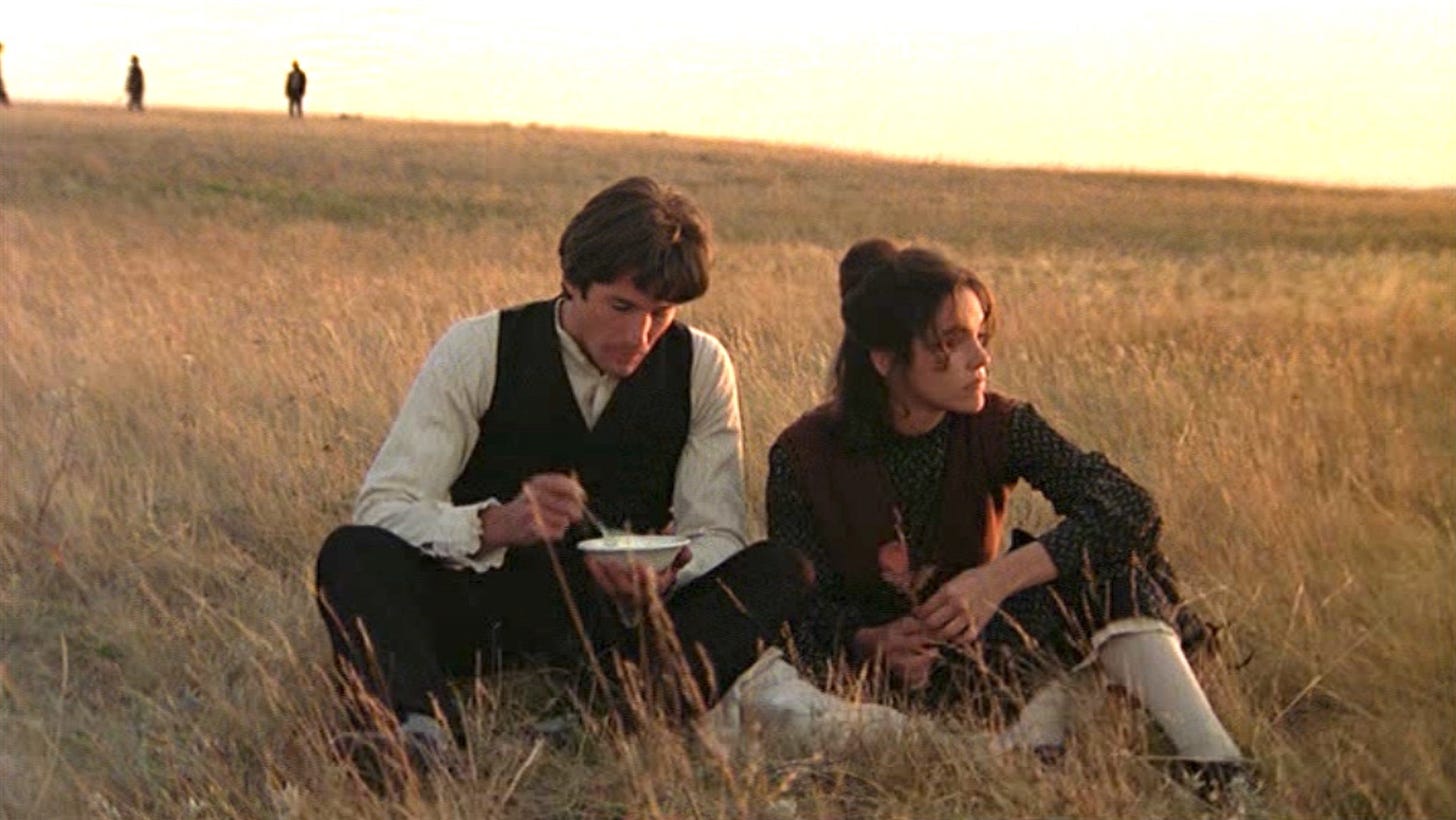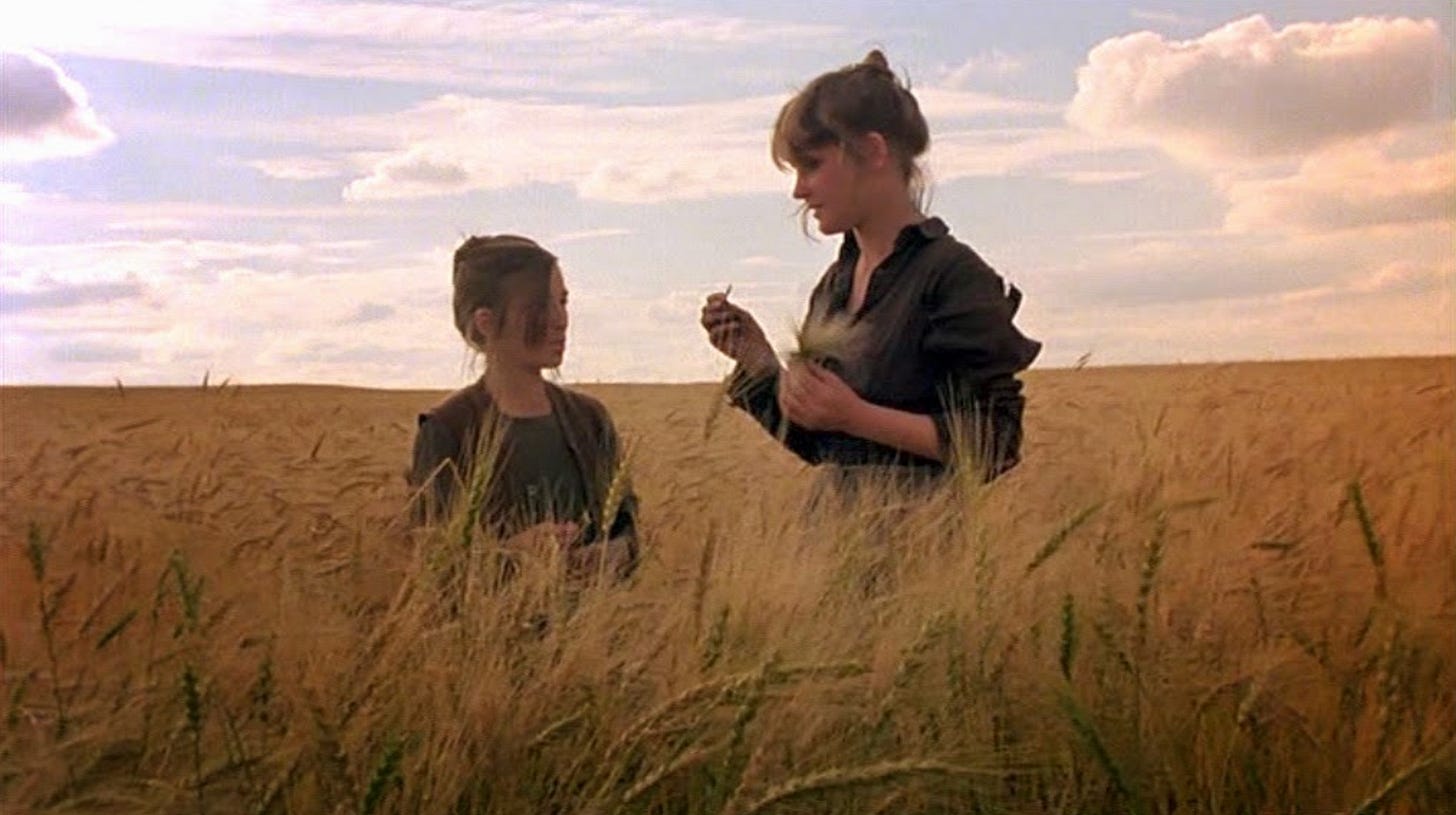Days of Heaven
Innocence drifting towards ruin
Watching Days of Heaven (1978) is the closest you will ever come to experiencing a memory that isn’t your own. (At least until neural interfaces become more advanced.) Not the characters’ memory, but something older: like a memory of America’s promise before it industrialized its soul. Telling any story about America that doesn’t include the foundational oppression of its founding can feel incomplete, but the evils of opportunism on display here resonate beyond the frame. Terrence Malick’s second feature plays like a whisper carried on the wind through wheat fields: a story about lovers, laborers, and landowners that lets silence and sunlight do most of the talking.
The plot, spare and biblical, follows Bill (Richard Gere), a steelworker in early 20th-century Chicago, who accidentally kills his boss (whoops) and flees the city with his girlfriend, Abby (Brooke Adams), and his kid sister, Linda (Linda Manz), to the Texas Panhandle. There, they join a roving mass of seasonal workers harvesting wheat for a wealthy, unnamed farmer (Sam Shepard), who notices Abby and eventually falls for her. Bill, pretending to be Abby’s brother, sees an opportunity for a better life and encourages the relationship. The genius across all Malick films is the way he doesn’t waste time on dialogue trying to justify characters’ actions. We see Bill chart a course, and we may question his actions and feel disgust, but we accept the fidelity of the situation to life because, well, life is weird. And silent.
It’s a film full of contradictions: vast, open skies paired with tiny, boxed-in lives; an Edenic landscape cut down by machines. A love triangle where no one really wins, but everyone is too quiet or too proud to say what they want. The silence is key. Malick doesn’t bother with the usual scaffolding of character backstory or dialogue-driven scenes. Instead, he lets us drift through the story the way Linda does: half-knowing, half-guessing, observing from the margins. Her voiceover is erratic and plainspoken like a child trying to make sense of adult disasters. It’s one of the great cinematic narrations precisely because it doesn’t explain: it observes. “Sometimes I’d feel very old like my whole life’s over,” she says at one point, though she’s maybe twelve. In Malick’s world, time doesn’t unfold in order; it swells and contracts, depending on where your heart is.
The film is absurdly beautiful. Perhaps the second-best example of the phrase “every frame a painting” being true. (Barry Lyndon (1975) being the standard-bearer). Cinematographers Néstor Almendros and, later, Haskell Wexler, shot most of it during the “golden hour,” that narrow slice of day where the light is soft and vibrant. People look like silhouettes; animals move like ghosts. Fire spreads across fields like a biblical judgment. You could pause Days of Heaven at any moment and hang the image in a gallery, and yet none of it feels staged. Malick’s obsession with nature isn’t decorative: it’s existential. Nature doesn’t care about your plans, your lies, your clever manipulations. It just continues, eventually, without you.
Romantic fatalism is everywhere in Days of Heaven, but it doesn’t arrive with operatic intensity. There’s no breakdown, no screaming, no catharsis. Just wind and consequence. Abby, Bill, and the farmer each try to secure happiness: through love, labor, or land. But the land has its own logic. The harvest ends. The weather turns. Someone gets hurt. The tragedy feels inevitable, not because the characters are doomed from the start, but because they live in a world that punishes yearning. The moment they reach for more, the sky gets darker.
By the time the final train pulls out, Malick leaves us with a lone character, walking along the tracks with someone they’ve just met. “I’ve got to go now,” they say. “But I might come back.” Maybe they will. Maybe they never will. But the beauty of Days of Heaven is that it leaves them, and us, suspended in that possibility: a breath held between seasons.
Days of Heaven
Written and Directed by Terrence Malick
1978
94 minutes
English
Recommended way to watch (at time of publication): Streaming on Criterion Channel
You’ll like this if you like: Badlands (1973), The New World (2005), The Assassination of Jesse James by the Coward Robert Ford (2007) If you’ve ever wanted to get into Malick but have balked at the runtimes of his films, this is your best bet: 94 minute-Malick!


